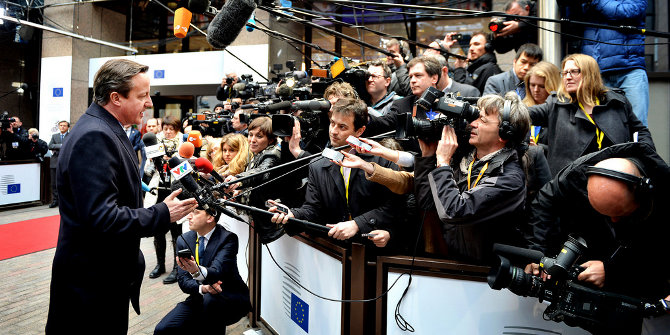 Why is public opinion in some countries principally pro-European while largely eurosceptic in others? Although the debate on EU integration has mainly formed around economic and identity-based arguments, Margarete Scherer draws on the European Social Survey to highlight religion as another dimension. She suggests political culture is explained in part by historical associations between church and state, and that the divergence in Catholic and Protestant conventions still affects sentiments not only on EU integration but on social protection as well.
Why is public opinion in some countries principally pro-European while largely eurosceptic in others? Although the debate on EU integration has mainly formed around economic and identity-based arguments, Margarete Scherer draws on the European Social Survey to highlight religion as another dimension. She suggests political culture is explained in part by historical associations between church and state, and that the divergence in Catholic and Protestant conventions still affects sentiments not only on EU integration but on social protection as well.
British euroscepticism is nothing new. What is new is examining the common ground it shares with Northern European countries such as Denmark, Finland and Sweden, as well as Estonia and Latvia. All of these nations have a clear Protestant tradition, and share the historical experience of the Reformation.
Such examination is made possible through the European Social Survey – a cross-national survey that measures the attitudes, beliefs and behaviour patterns of citizens across Europe – and which also focuses on explaining inter-country differences in attitudes towards European integration.
My research shows that people from traditionally Protestant countries are less likely to support European unification compared to those from traditionally Catholic countries. Protestant nations have been marked by a consensual relationship between Reformist churches and national political authorities, which resulted in a strong affiliation to the nation state. Such nations also defined their national character through a strong refusal of Catholic universalism and its adherence to the Pope as a supranational power. In fact, the head of state in a given Protestant country was often also the head of its church; church and state worked together at all levels.
This consensual relationship would shape the political culture of an entire society. It manifested in a distinctive Protestant culture that was characterised by a strong reliance on the national political system. Today, this finds its expression in a rather distrustful sentiment toward internationalism and, as a result, creates a less favourable opinion towards the European political system. Yet it is not religion alone which influences euroscepticism but rather the steady public opinion influenced by the public education system and mass media. Regardless of whether people belong to a church or not, their religious background sets the level of support for, or opposition against, European integration.
More interestingly, religious background affects the way people perceive the implications of EU policies on the national welfare system. Individuals from Protestant countries who generally support welfare distribution would typically oppose EU integration, while those who generally prefer less redistribution would typically support it. This means religious history is a factor affecting the relationship between welfare attitudes and EU attitudes.
Again, this can be explained by looking at the specificities of the Reformist churches. Welfare policies of the Protestant Church were directed towards cooperation with the state and towards a centralised system of national social assistance. Obviously, Protestant nations include two opposing welfare state models: the British welfare system of the liberal kind is targeted at a comparatively lower level of welfare provision, while the Scandinavian social-democratic system is characterised by an exceptionally high level of welfare provision. But what both models have in common is a redistribution system with universalistic and egalitarian principles that aims to prevent poverty throughout society.
The question is what do people expect when their national social protection scheme is translated into an EU median model of social protection. In the Protestant case, the EU may be perceived as a threat to national solidarity because societies may be becoming too differentiated and heterogeneous. This means people who favour redistribution would perceive European integration as a threating construction because they fear social equality is less attainable at the EU level. In contrast, those who oppose redistribution will be Europe-friendly, as they expect EU efforts to be less directed toward egalitarian principles and more toward a higher commitment to social protection.
My research also underlines the different responses to an EU-level harmonisation of redistribution and highlights the divergence between Catholic and Protestant traditions in influencing perspectives on redistribution. Catholicism teaches redistribution as being provided within a more subsidiary and familial competence, while the main objective of Catholic welfare regimes is to preserve income levels for employees. So, the sphere of solidarity remains quite narrow and the state interferes only when the family’s capacity is exhausted. Therefore, people from Catholic countries who favour redistribution by the government will be more in favour of European integration as they expect the further convergence of EU social policy to push redistribution less toward familial responsibilities and more toward state intervention. In contrast, those who generally oppose redistribution will also be opposed to integration because of weaker EU efforts to conserve traditional family structures and the principle of subsidiarity.
Clearly, religious historical background still shapes contemporary political attitudes towards the EU. This is quite surprising, as empirical research, along with public understanding, tend to explain euroscepticism along economic and identity-based lines. A fully-specified statistical model entails several coexisting factors which are theoretically important in making a rough differentiation between Protestant and Catholic nations. Two of these factors are the rate of unemployment and net returns from the EU budget. The theory states that people apply a cost-benefit analysis when thinking about European integration and form their attitudes on the basis of whether their integration will result in national economic gains or losses. Another factor stems from a national identity perspective. The models used included the percentage of immigrants in each nation in order to bear in mind that euroscepticism may arise when people fear that EU integration threatens the national identity and community through growing denationalisation.
Although the analysis confirms these established explanations, it also offers a new religiously based perspective: the Reformation and the resulting church-state relations still have implications on the political cultures of today. Religious background is a deep layer of public support for European integration while religious doctrines have shaped people’s support for and/or opposition to government intervention in social protection for centuries.
This article is a shorter version of the one published in JCMS: Journal of Common Market Studies
Note: This article gives the views of the author, and not the position of the British Politics and Policy blog, nor of the London School of Economics. Please read our comments policy before posting.
 Margarete Scherer is Associate in the faculty of Social Sciences at the Goethe University.
Margarete Scherer is Associate in the faculty of Social Sciences at the Goethe University.
(Featured image credit: Holly Hayes CC BY-NC 2.0)








Interesting but I’m not sure the correspondence holds … Lutheranism. Calvinism. Anglicanism, Baptist, Methodist represent a vast array of views which are not always antagonistic to Catholicism … surely the debate that needs to be had is exactly that of subsidiarity or federalism in Europe. I am in favour of subsidiarity. I am a Methodist with Catholic and puritan leanings who loves the theology of Bach’s Lutheran Masses and Cantatas. I might be more pro-EU if it did not act as an unelected dictatorship and had not punished Greece so vindictively.